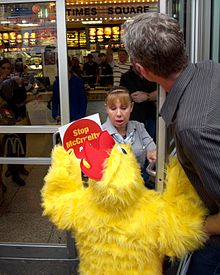Criticism of McDonald's
In the late 1980s, Phil Sokolof, a millionaire businessman who had suffered a heart attack at the age of 43, took out full-page newspaper ads in New York, Chicago, and other large cities accusing McDonald's menu of being a threat to American health, and asking them to stop using beef tallow to cook their french fries.
Among the critiques were allegations that McDonald's (along with other companies within the fast food industry) uses its political influence to increase its profits at the expense of people's health and the social conditions of its workers.
Six weeks after the film premiered, McDonald's announced that it was eliminating the super size option, and was creating the adult Happy Meal.
[citation needed] In response to public pressure, McDonald's has sought to include more healthy choices in its menu and has introduced a new slogan to its recruitment posters: "Not bad for a McJob".
[5] The word McJob, first attested in the mid-1980s[6] and later popularized by Canadian novelist Douglas Coupland in his book Generation X: Tales for an Accelerated Culture, has become a buzzword for low-paid, unskilled work with few prospects or benefits and little security.
In an effort to respond to growing consumer awareness of food provenance, the fast-food chain changed its supplier of both coffee beans and milk.
UK chief executive Steve Easterbrook said: "British consumers are increasingly interested in the quality, sourcing, and ethics of the food and drink they buy".
[7] In a bid to tap into the ethical consumer market,[8] McDonald's switched to using coffee beans taken from stocks that are certified by the Rainforest Alliance, a conservation group.
[11] With regard to acquiring chickens from suppliers who use CAK/CAS methods of slaughter, McDonald's says that it needs to see more research "to help determine whether any CAS system in current use is optimal from an animal welfare perspective.
[13] Merriam-Webster's Unabridged Dictionary also contains the word "McMansion", a critical, pejorative term used to describe an overly large, ostentatious, sometimes poorly designed or constructed house, often found in a suburb or in new developments on traditionally rural land.
In the game, the player plays the role of a McDonald's CEO, choosing whether or not to use controversial practices like genetically altered cow feed, plowing over rainforests, and corrupting public officials.
[17] In April 2020, McDonald's apologized after footage showing a notice that was being displayed inside one of its restaurants in China saying that "black people are not allowed to enter.
[30] McDonald's efforts to reduce solid waste by using less packaging and by promoting the use of recycled materials were recognized by the U.S. Environmental Protection Agency.
[32] In April 2008, McDonald's announced that 11 of its restaurants in Sheffield, England, were engaged in a biomass trial program that cut its waste and carbon footprint by half in the area.
Building on past efforts, specifically a restaurant it opened in Sweden in 2000 that was the first to incorporate green ideas, McDonald's designed the Chicago site to save energy by managing storm water, using skylights for more natural lighting, and installing partitions and tabletops made from recycled goods, among other measures.
The environmental benefits of this technology are controversial, with critics noting that biodegradation is slow and produces greenhouse gases, and that contamination of traditional plastic waste streams with bioplastics can complicate recycling efforts.
[43][44] In 2009, Keep Britain Tidy likewise found McDonald's to be the leading producer of fast-food litter on British streets, accounting for 29% of the total.
[45] An early protest against this practice was "Operation Send-It-Back", launched by London Greenpeace in 1994 in response to the company's targeting of activists in the McLibel Trial.
In April 2007, in Perth, Western Australia, McDonald's pleaded guilty to five charges relating to the employment of children under 15 in one of its outlets and was fined A$8,000.


